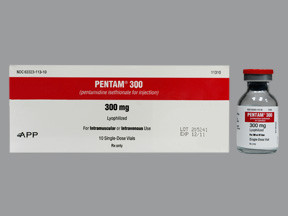PENTAMIDINE ISETHIONATE - INJECTION
PHONETIC PRONUNCIATION: (pen-TAM-ih-deen eye-seh-THIGH-oh-nate)
COMMON BRAND NAME(S): Pentam 300
GENERIC NAME(S): pentamidine isethionate
Uses
USES: Pentamidine is used to treat a serious lung infection (Pneumocystis pneumonia-PCP) in people with immune system problems, including people with acquired immunodeficiency syndrome (AIDS). Pentamidine belongs to a class of drugs known as antiprotozoals. It works by killing the organism that causes the infection.
How to use PENTAMIDINE ISETHIONATE - INJECTION
HOW TO USE: This medication is given by injection into a vein or muscle as directed by your doctor, usually once a day. If it is given by injection into a vein, it is slowly injected over 1 to 2 hours. Tell your doctor right away if you notice leakage, redness, or pain during an injection into your vein. If this medication is given by injection into a muscle, it is usually injected into the buttock/hip area. The dosage is based on your medical condition, weight, and response to treatment. If you are giving this medication to yourself at home, learn all preparation and usage instructions from your health care professional. Before using, check this product visually for particles or discoloration. If either is present, do not use the liquid. Learn how to store and discard medical supplies safely. Tell your doctor if your condition does not improve or if it worsens.
Side Effects
Precautions
Interactions
Overdose
Images
Reviews
Faq for PENTAMIDINE ISETHIONATE - INJECTION
Pentamidine Isethionate - Injection is a medication used to treat certain types of pneumonia caused by a specific parasite called Pneumocystis jirovecii.
This medication is given as an injection into a vein (intravenous) by a healthcare professional in a hospital or clinic setting.
Common side effects may include nausea, vomiting, diarrhea, decreased appetite, rash, low blood pressure, and electrolyte imbalances. It can also cause serious side effects like kidney problems and low blood sugar.
The medication usually starts working within a few days to a week. However, the full treatment course may last several weeks, depending on the condition being treated.
It is important to inform your healthcare provider about all the medications you are currently taking, including prescription and over-the-counter drugs, as well as any herbal supplements, to avoid potential drug interactions.
If you miss a dose, contact your healthcare provider for instructions. It is essential not to skip doses as it may affect the effectiveness of the treatment.
It is important to discuss with your doctor the potential risks and benefits of using this medication during pregnancy or while breastfeeding, as it may have adverse effects on the developing baby or nursing infant.
This medication should be stored at room temperature, away from moisture and heat. Keep it out of the reach of children and discard any unused portion after the expiration date.
If you suspect an overdose, seek immediate medical attention. Overdose symptoms may include severe nausea, vomiting, abdominal pain, dizziness, and loss of consciousness.
Disclaimer
IMPORTANT: HOW TO USE THIS INFORMATION: This is a summary and does NOT have all possible information about this product. This information does not assure that this product is safe, effective, or appropriate for you. This information is not individual medical advice and does not substitute for the advice of your health care professional. Always ask your health care professional for complete information about this product and your specific health needs.

No Reviews Yet